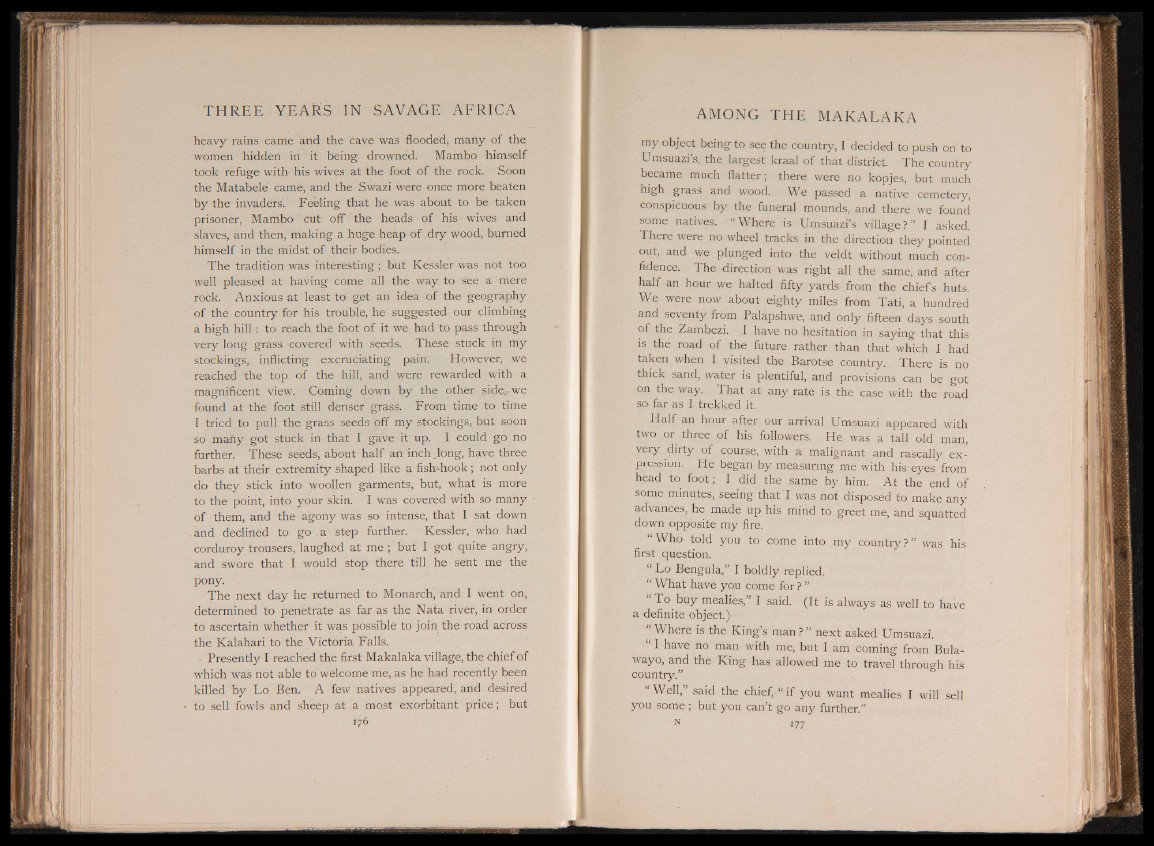
heavy rains came and the cave was flooded, many of the
women hidden in it being drowned, Mambo himself
took refuge with his wives at the foot of the rock. Soon
the Matabele came, and the Swazi were once more beaten
by the invaders. Feeling that he was about to be taken
•prisoner, Mambo cut off the heads of his wives and
slaves, and then, making a huge heap of dry wood, burned
himself in the midst of their bodies.
The tradition was interesting; but Kessler was not too
well pleased at having come all the way to see a mere
rock. Anxious at least to get an idea of the geography
of the country for his trouble, he suggested our climbing
a high hill: to reach the foot of it we had to pass through
very long grass covered with seeds. These stuck in my
stockings, inflicting excruciating pain. However, we
reached the top of the hill, and were rewarded with a
magnificent view. Coming down by the other side- we
found at the foot still denser grass. From time to time
I tried to pull the grass seeds off my stockings, but soon
so many got stuck in that I gave it up. I could go no
further. These seeds, about half an inch.long, have three
barbs at their extremity shaped like a fish-hook; not only
do they stick into woollen garments, but, what is more
to the point, into your skin. I was covered with so many
of them, and the agony was so intense, that I sat down
and declined to go .a step further. Kessler, who had
corduroy trousers, laughed at me ; but I got quite angry,
and swore that I would stop there till he sent me the
pony.
The next day he returned to Monarch, and I went on,
determined to penetrate as far as the Nafa river, in order
to ascertain whether it was possible to join the road across
the Kalahari to the Victoria Falls.
- Presently I reached the first M^kalaka village, the chief of
which was not able to welcome me, as he had recently been
killed by Lo Ben. A few natives appeared, and desired
to sell fowls and sheep at a most exorbitant price; but
176
my object being to see the country, I decided to push on to
Umsuazi’s, the largest kraal of that district. The country
became much flatter; there: were no kopjes, but much
Hgfo grass and wood. We passed a native cemetery,
conspicuous by the funeral mounds, and there we found
some natives. “ Where is Umsuazi’s village?” I asked.
There were no wheel tracks in the direction they pointed
out, and we plunged into the veldt without much confidence.
The direction was right all the same, and after
half an hour we halted fifty yards from the chiefs huts.
We were now about eighty miles from Tati, a hundred
and seventy from Palapshwe, and only fifteen days south
of the Zambezi. I have no hesitation in saying that this
is the road of the future rather than that which I had
taken when I visited the Barotse country. There is no
thick sand, water is plentiful, and provisions can be got
on the way. That at any rate is the case with the road
so far as I trekked it.
Half an hour after our arrival Umsuazi appeared with
two or three of his followers. He was a tall old man,
very dirty of course, with a malignant and rascally expression.
He began by measuring me with his eyes from
head to foot; I did the same by him. At the end of
some minutes, seeing that I was not disposed to make any
advances, he made up his mind to greet me, and squatted
down opposite my fire.
“ Who told you to come into my country?” was his
first question.
“ Lo Bengula,” I boldly replied.
“ What have you come for ? ”
To buy mealies,” I said. (It is always as well to have
a definite object.)
Where is the King s man ? ” next asked Umsuazi.
I have no man with me, but I am coming from Bulawayo,
and the King has allowed me to travel through his
country.”
A Well,” said the chief, “ if you want mealies I will sell
you some ; but you can’t go any further.”
n 177